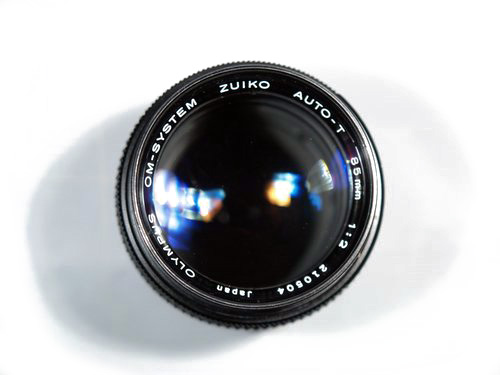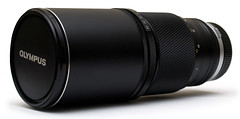Olympus OM lenses
Information about the Olympus OM System Zuiko interchangeable lenses for 35mm SLR cameras

|
| Zuiko 85mm f/2 image by Tim Williams (Image rights) |
Contents
History
With the introduction of the Olympus OM system, a new range of Zuiko lenses was designed by Olympus. The bayonet mount has a very large diameter, and all the lenses are very compact compared to other brands.
Compared to many other manufacturers, Olympus took a slightly different approach to lens grading. Where many companies released consumer-class kit lenses made out of inferior products or designs, all Olympus OM lenses were made to the same high standard. The differentiation of the lenses was done simply by their maximum aperture. Referral to the below list of released system lenses will show the 'consumer' model of the OM 50mm for example has a maximum aperture of f/1.8. There was a 'prosumer' model released with a f/1.4 maximum, and even further a professional model with a maximum aperture of f/1.2.
Olympus was able to offer this range of very fast, compact lenses due the width of the lens mount. At the height of its success, the OM system had the largest range of f/2 lenses of any camera manufacturer or system ever made before, including f/2 macros and telephoto primes up to 250mm.
All the lenses can mount on all the bodies, except for the following limitations:
- the Zuiko 500mm f/8, Zuiko 600mm f/6.5, Zuiko 1000mm f/11, 24mm f/3.5 Shift, 35mm f/2.8 Shift and Auto Bellows can't be used on OM-101/OM-88;
- the Zuiko 500mm f/8, Zuiko 600mm f/6.5, Zuiko 1000mm f/11 and Auto Bellows can't be used on OM-707/OM-77;
- the autofocus lenses for the OM-707 / OM-77 and OM-101 / OM-88 bodies, those lenses do not have a manual focusing ring and are useless on the other bodies.
Manual focus lenses
Here is a list of the lenses that were commercially sold:

|
| Zuiko 24/2 image by pnoid00 (Image rights) |
Wide-Angle Primes
- 8mm f/2.8 - Fisheye, round image
- 16mm f/3.5 - Fisheye, full image
- 18mm f/3.5
- 21mm f/2 - Record speed for focal length at the time
- 21mm f/3.5
- 24mm f/2 - Record speed for focal length at the time
- 24mm f/2.8

|
| Zuiko 24/2.8 image by Tim Williams (Image rights) |
- 24mm f/3.5 - Shift, with ED element, rare and spectacular
- 28mm f/2
- 28mm f/2.8
- 28mm f/3.5
- 35mm f/2
- 35mm f/2.8
- 35mm f/2.8 Shift
Standard Primes

|
| Zuiko 50/1.4 image by Tim Williams (Image rights) |
- 40mm f/2 Pancake - Uncommon
- 50mm f/1.2
- 50mm f/1.4 - Normal lens
- 50mm f/1.8 - Normal lens
- 50mm f/2 Macro - Uncommon
- 50mm f/3.5 Macro
- 55mm f/1.2 - predecessor of the 50mm f/1.2
Telephoto Primes

|
| Zuiko 300/4.5 image by Tim Williams (Image rights) |
- 80mm f/4 Macro - For bellows or extension tube only, two versions with manual or auto diaphragm
- 85mm f/2
- 90mm f/2 Macro - Uncommon
- 100mm f/2 - With ED element
- 100mm f/2.8
- 135mm f/2.8
- 135mm f/3.5
- 135mm f/4.5 Macro - For bellows or extension tube only
- 180mm f/2 - With ED element, rare
- 180mm f/2.8
- 200mm f/4
- 200mm f/5
- 250mm f/2 - With ED element, rare
- 300mm f/4.5
- 350mm f/2.8 - With ED element, rare
- 400mm f/6.3
- 500mm f/8 Mirror
- 600mm f/6.5 - Rare
- 1000mm f/11 - Rare
Zooms

|
| Zuiko 35–70/4 image by Tim Williams (Image rights) |
- 28-48mm f/4
- 28-85mm f/3.5-4.5 - Very rare
- 35-70mm f/3.5-4.5
- 35-70mm f/3.5-4.8 S-Zuiko - Released together with the OM-2000 and only sold as a kit with this body
- 35-70mm f/3.6
- 35-70mm f/4
- 35-70mm f/4 AF - Taking three AAA batteries, this was one of the first attempts of autofocus with any type of body. Introduced with the OM-30'
- 35-80mm f/2.8 - With ED element, launched with the OM-3Ti / OM-3T
- 35-105mm f/3.5-4.5
- 50-250mm f/5
- 65-200mm f/4
- 70-210mm f/4.5-5.6 S-Zuiko - Released with the OM-2000
- 75-150mm f/4
- 85-250mm f/5
- 100-200mm f/5
Micro lenses

|
| Zuiko 20mm f/2 image by s58y (Image rights) |
Some special micro lenses were made for bellows use only:
- 20mm f/2 auto
- 20mm f/3.5 manual - An adapter ring is necessary
- 38mm f/2.8 auto
- 38mm f/3.5 manual - An adapter ring is necessary
Autofocus and powerfocus lenses

|
| image by Tim Williams (Image rights) |
The autofocus lenses were intended for the OM-707 / OM-77 but they can be used on the OM-101 / OM-88 too. The powerfocus lenses are specific to the OM-101 / OM-88. All these lenses lack a manual focusing ring, so cannot be used on manual OM bodies, or 4/3rds cameras (not even with OM adaptors). However, if, when fitting these lenses, they are not twisted all the way on, the front part of the lens can be used as a focusing ring: this still maintains light-tightness.
- 24mm f/2.8 AF
- 28mm f/2.8 AF
- 50mm f/1.8 AF
- 50mm f/2 PF - Only for the OM-101 / OM-88
- 50mm f/2.8 AF Macro
- 28-85mm f/3.5-4.5 AF
- 35-70mm f/3.5-4.5 AF
- 35-70mm f/3.5-4.5 PF - Only for the OM-101 / OM-88
- 35-105mm f/3.5-4.5 AF
- 70-210mm f/3.5-4.5 AF
Prototype lenses
Here is a list of the manual Zuiko lenses that were never marketed:
- 18mm f/3.5, prototype of 18 f/3.5 , L.zuiko with 12 elements 10 group, fixed 72mm thread
- 50mm f/2 pancake, prototype of 40 f/2 pancake
- 85mm f/1.4, prototype, with GRIN (GRadient INdex of Refraction) elements
- 160mm f/3.5, prototype
- 300mm f/6.3, prototype
- 400mm f/4.5, prototype
- 500mm f/5.6, prototype
- 800mm f/9, prototype
- 1200mm f/14, prototype
- 24-40mm f/4, prototype, More Information
- 90-250mm f/? prototype of 85-250mm f/5 - Unknown max aperture, maybe f/4 or f/3.6
Links
- Zuiko lenses in the Photography in Malaysia website
- OM Sales information file, presenting the OM system in detail, including a page about the Zuiko lenses that never made it
- 85mm f1.4 prototype exhibited at the Olympus Technology Fair in 1989, presented in the Maitani Fan website